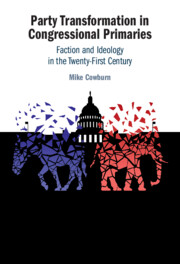Book contents
- Party Transformation in Congressional Primaries
- Reviews
- Party Transformation in Congressional Primaries
- Copyright page
- Contents
- Figures
- Tables
- Acknowledgments
- 1 Introduction
- Part I Primary Transformation
- Part II Party Transformation
- 4 A Most Likely Case
- 5 Selective Effect
- 6 Between-Election Adaptative Effect
- 7 Within-Election Adaptative Effect
- 8 Conclusion
- References
- Index
7 - Within-Election Adaptative Effect
Do Primaries Induce Artificial Positioning?
from Part II - Party Transformation
Published online by Cambridge University Press: 09 November 2024
- Party Transformation in Congressional Primaries
- Reviews
- Party Transformation in Congressional Primaries
- Copyright page
- Contents
- Figures
- Tables
- Acknowledgments
- 1 Introduction
- Part I Primary Transformation
- Part II Party Transformation
- 4 A Most Likely Case
- 5 Selective Effect
- 6 Between-Election Adaptative Effect
- 7 Within-Election Adaptative Effect
- 8 Conclusion
- References
- Index
Summary
Primaries might also contribute to party transformation by incentivizing candidates to move position within an election cycle. Candidates might face a “strategic positioning dilemma” if they must first satisfy an extreme selectorate to earn the nomination before facing a comparatively moderate general electorate. This chapter therefore tests whether all candidates in a primary adapt their positions away from the center during the nomination phase of a single election cycle, presenting general election voters with polarized choices. To scale positions both during and after a primary it uses a text-as-data approach based on candidates’ communication on Twitter during the 2020 election cycle. It finds that Democratic candidates who lost primaries became significantly more moderate immediately after their defeat, especially if they lost in ideological or factional primaries. It does not observe this pattern among Republican losers. This chapter demonstrates a further way in which primaries may contribute to polarization, incentivizing candidates to adopt positions further from the ideological center during the nomination phase of the election cycle.
Keywords
- Type
- Chapter
- Information
- Party Transformation in Congressional PrimariesFaction and Ideology in the Twenty-First Century, pp. 181 - 198Publisher: Cambridge University PressPrint publication year: 2024

